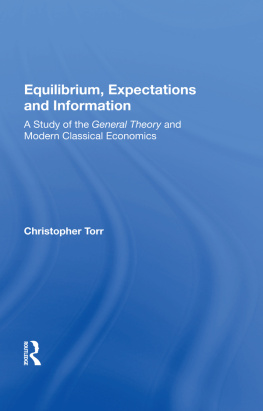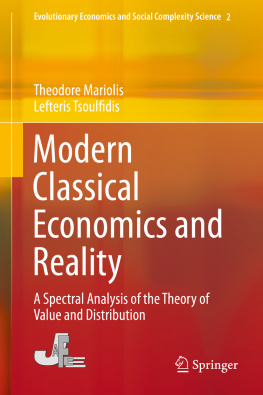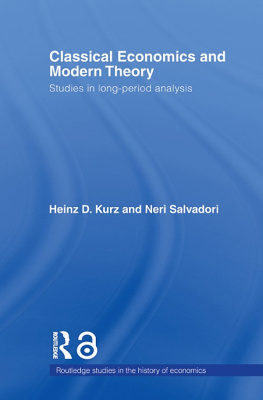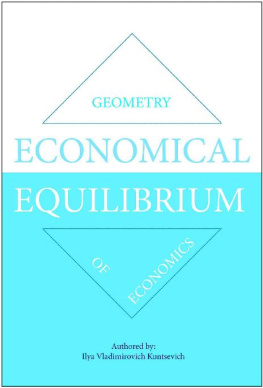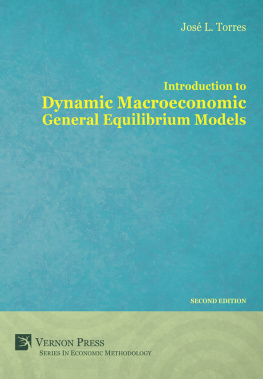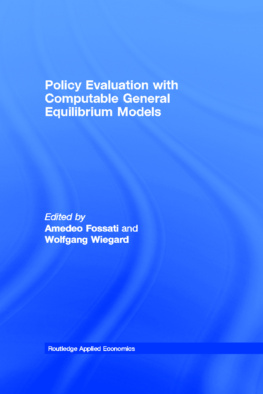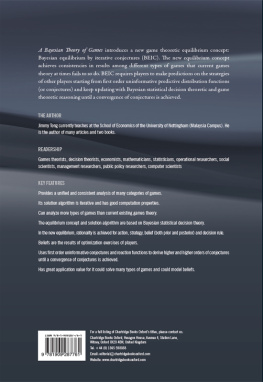Equilibrium, Expectations and Information
First published 1988 by Westview Press
Published 2018 by Routledge
52 Vanderbilt Avenue, New York, NY 10017
2 Park Square, Milton Park, Abingdon, Oxon OX14 4RN
Routledge is an imprint of the Taylor & Francis Group, an informa business
Copyright Christopher Torr 1988
All rights reserved. No part of this book may be reprinted or reproduced or utilised in any form or by any electronic, mechanical, or other means, now known or hereafter invented, including photocopying and recording, or in any information storage or retrieval system, without permission in writing from the publishers.
Notice:
Product or corporate names may be trademarks or registered trademarks, and are used only for identification and explanation without intent to infringe.
Library of Congress Cataloging-in-Publication Data
Torr, Christopher.
Equilibrium, expectations, and information : a study of the general theory and modern classical economics I by Christopher Torr.
p. cm. (Aspects of political economy)
Bibliography: p.
Includes index.
1. Keynesian economics. 2. Keynes. John Maynard. 18831946. General theory of employment, interest, and money. 3. Equilibrium (Economics) 4. Rational expectations (Econotnic theory) I. Title. II. Series.
HB99.7.T67 1988
330.156dcl9
88-14421
CIP
ISBN 13: 978-0-367-00704-1 (hbk)
To L, S & N
I should like to thank all those who have assisted me in writing this book, directly or indirectly. A special word of thanks is due to Professor L. M. Lachmann, whose help has been of inestimable value. I should also like to thank Victoria Chick, Geoff Harcourt, Jan Kregel, Colin Rogers, Peet Strydom and Paul Wells for their help over the past few years. Although I wish to hold none of my friends responsible for the remaining errors, there would have been more had I not been able to rely on Jochen Rundes assistance, and I am indebted to him for giving so freely of his time. , in particular, would have been a very different chapter without his help. Grateful thanks are due to Karl Mittermaier for his meticulous comments on what I had thought was a final draft. Caroline de Wet kindly assisted me with the diagrams.
Parts of also draws from an essay which appeared in Subjectivism, Intelligibility and Economic Understanding , published by New York University Press. Permission to draw on these articles is gratefully acknowledged.
References to Keyness Collected Writings are indicated by CW, followed by the relevant volume and page number(s). References to Keyness General Theory of Employment, Interest and Money are indicated by GT, followed by the page number(s).
When it comes to the choice of whether to use he or she in generalizations, I know of no infallible rule to apply. I have adopted the expedient of sometimes using the one form and sometimes the other.
This book is based upon a Ph.D. Thesis submitted to Rhodes University. I should like to thank Mike Truu for his kind help in this regard.
On the opening page of The General Theory of Employment, Interest and Money Keynes asserts that his general theory includes the classical theory as a special case. Williams (1948, p. 274) notes that: To reduce classical economics to the status of a special case under his general theory, as he did so dramatically in his single-page first chapter, was to stake out his claim on what he undoubtedly regarded as the highest conceivable level; it probably has no parallel in economic literature. But the questions remain: how valid is his system as a picture of reality, what is the range of its application, how useful is it as a guide to economic policy?
It is now over fifty years since the appearance of the General Theory and the stream of books and articles on what Keynes really meant or actually really didnt mean shows no sign of abating. This book will not even begin to evaluate his overall contribution. Instead it will analyse his approach from a particular angle, with the title Equilibrium, Expectations and Information providing the framework for the investigation. That the title has been borrowed from G. B. Richardsons 1959 Economic Journal article is no accident. Richardsons work has been unduly neglected and his trichotomy serves as a convenient platform from which to analyse features of Keyness approach, and to compare them with those of his interpreters.
The sub-title of this book is A Study of the General Theory and Modern Classical Economics. Hence it will not only be concerned with the equilibrium-expectations-information framework of the General Theory , but will also examine the views of modern classical economists on these matters.
While some may suppose that modern classical economics is synonymous with the rational expectations approach of Lucas and his followers, there are other modern classical economists the modern Ricardians who have as much a claim to be regarded as the heirs of the classical tradition as anybody else. The views of the modern Ricardians are diametrically opposed to those of Chicago, at least in so far as we leave out the role to be accorded to expectations. While modern Ricardians are aware of the existence of Chicago, there is very little evidence of reciprocal awareness. That there should be agreement on the correct way to treat expectations seems somewhat odd at first sight. Modern Ricardians argue that expectations should be left out of economic analysis as far as possible whereas the opposite view seems to be presented by those who promote rational expectations. The reasons for such agreement will be presented in .
This book will thus attempt to elucidate the views of Keynes as far as equilibrium, expectations and information are concerned, and compare them with those of modern classical economists of the Chicago and Ricardian persuasion.
By presenting his approach as a general one, Keynes provided the economics profession with a perennial examination question. His claim to generality has, however, tended to divert attention from an important issue. This concerns the type of environment in which the action is to take place.
Keyness principle of effective demand is applied to a society which Keynes originally referred to as an entrepreneur economy. The postulates of the classical economics was originally called The distinction between a co-operative economy and an entrepreneur economy (Keyness Collected Works (CW), vol. 29, pp. 76102). Keynes points out that we live in an entrepreneur economy (CW, vol. 29, pp. 789) and that the classical theory is inapplicable to an entrepreneur economy (CW, vol. 29, p. 83) unless the economy is at full employment ( General Theory (GT), p. 378).
The environmental issue provides a means of comparing Keyness approach with those of the classical economists, ancient and modern.
Because the General Theory provides an explanation for positions of full employment and for positions of persistent unemployment whereas classical and neoclassical theory appear to provide an explanation for full employment situations only, a case can of course be made that the General Theory is a general theory. While we do not wish to deny this, so much time and energy has been spent on the debate that the question of the type of economic society in question has suffered malign neglect.
The general-special issue is perhaps best avoided until it is established what type of economic environment is being considered. Once the environment has been specified, the need to distinguish between a general and a special theory may be superfluous. The same cannot be said of the natural sciences.

